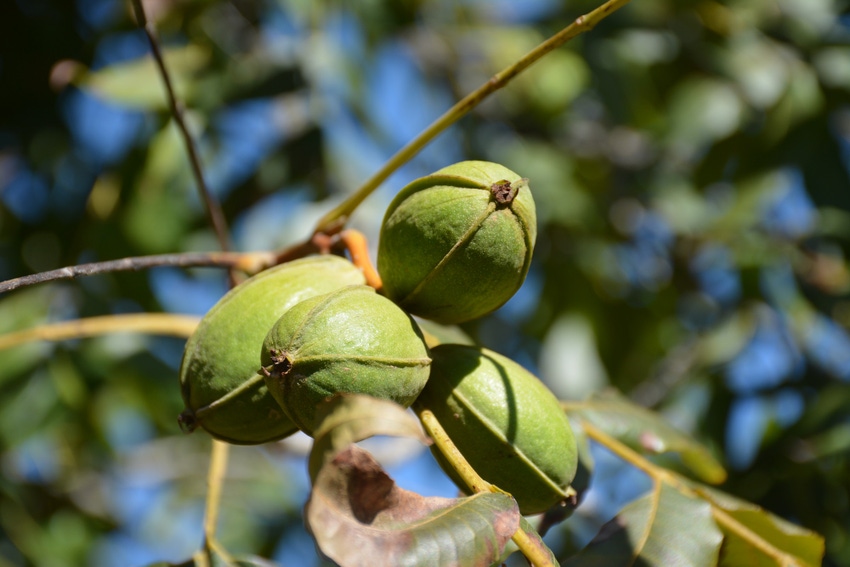October 27, 2017

Some things are just so totally American, like Mom's apple pie, baseball, American football, pickup trucks, John Wayne, John Deere, and barbecue. Other candidates include reality TV, the drive-thru, infomercials, pharmaceutical commercials, and game shows, NASCAR, the World Series, the Triple Crown, video games and blockbuster movies.
The mighty oak is honored among trees in America as are the Redwoods and the Aspens. Corn is king in Iowa, cattle and cotton in Texas, citrus in Florida and California, potatoes in Idaho and apples in Washington and New York.
But disheartened Texas pecan growers and their counter parts in New Mexico, Georgia and just about everywhere where else pecans are grown commercially, are all looking for a little more recognition. The truly Native American nut is a fabulous hit at home where it's loved and used extensively in cooking and especially in deserts. They taste good, look good, are healthy to eat, and they're All American!
But when it comes to the world market, exports of American-grown pecans are out-performed by both the almond and the pistachio, which enjoy brand and consumer-awareness and benefit from more forward-thinking than any other group of American nut grower groups. Other major U.S. nut performers include the peanut (actually a legume and not a nut) and the walnut
INTERNATIONAL MARKETS
Kevin Ivey is a West Texas pecan grower and a major supporter of marketing pecans to an international market. He is also the president of the U.S. Pecan Growers Council and knows more than a little when it comes to marketing a nut to the world market. He has watched China welcome the pecan as a high quality nut import in recent years, and says the expansion of U.S. pecans into the Asian market has been and should remain a successful venture, though perhaps it has yet to reach its peak.
But the goal of developing a consumer base in a foreign market is lofty, though the problem is pretty simple. Western growers of high quality almonds recognized long ago that the international nut market represented a major boost to their industry. It took years of determination, but the success level for California nut producers marketing in the global market has been both robust and successful. Ivey and other pecans growers want to tap into that same world market with the same kind of determination.
TARGET INDIA
With his eye on India as the next big market for U.S. pecans, Ivey and friends have recently found that Texas Senator Ted Cruz understands the disparity for pecan growers who face costly tariffs on pecans in India three times higher than those for U.S. almonds and pistachios.
"We needed someone in Congress who can see how pecan growers have a chance to expand the growing popularity of the pecan in India, and who is also willing to work toward solving the tariff-related penalties Texas and other American pecan growers face there," Ivey told the Dallas Morning News last week.
Ivey, whose family has been producing pecans near El Paso for generations, said Cruz immediately recognized the injustice and opportunity and set to work contacting fellow lawmakers who would rally in an effort to encourage U.S. Trade Representative Robert Lighthizer to work with India trade representatives in addressing the tariff issue.
Americans in general understand and largely appreciate the versatility of the pecan. From famous, mostly southern desert dishes that make the pecan central in its sweet invention, to its traditional role of flavoring in the stuffing for the Thanksgiving turkey or when added to fruit and vegetable salads, or even served up from a warm oven, covered in a sweet honey glaze and spices and ready to munch.
HEALTH ADVANTAGES
"If you look strictly at the health benefits and the taste, the pecans are a better nut,” said Bob Ackerly, a South Texas pecan grower who says cultivating a successful pecan operation is a long and costly process.
Shannon Ivey, a fourth-generation pecan farmer who grows pecans near El Paso, agrees. She says the biggest challenge is cultivating the young pecan trees, which can take nearly 10 years to pay off. Fire, thunderstorms, high wind, and hail can destroy a crop in a heartbeat, and destroy a field of trees in a grove in the blink of an eye.
Ivey and others say overcoming a complex tariff experience in India that can be challenging and unfair isn't easy, especially with so much focus on current renegotiation of the North American Free Trade Agreement (NAFTA), which may takes months or into the next year before an accord is reached.
But Texas growers are hopeful they can make inroads in the Indian market this year, and that tariff talks can help to resolve the issue for U.S. pecan traders before the upcoming holidays arrive.
LEARNING FROM PAST MISTAKES
Ivey believes the foundation for success of the California almond industry occurred when they agreed years ago to participate in a product development program that would benefit the industry and the many growers that support it. USDA suggested growers take a small portion of their crop income each year and create a product council to create and promote new markets and boost the image and marketing awareness of the industry. Last year many pecan growers formed their own pecan council to promote the nut as a healthy and tasty food.
Those efforts could well help U.S. pecan growers uncover and take advantage of an attractive new and developing market in India, where the middle class is growing and demand for food imports is also rising among international consumers.
You May Also Like




